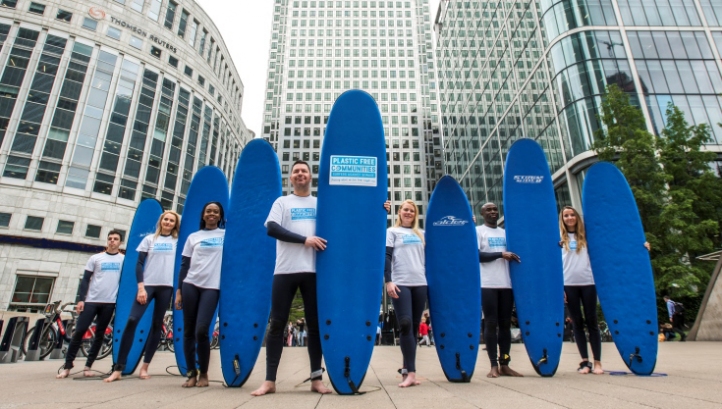London’s Canary Wharf has today (5 June) become the first commercial centre in the world to be awarded Plastic Free Community status by marine charity Surfers Against Sewage, one year after its managing body Canary Wharf Group launched its flagship plastic reduction scheme.

The announcement comes on the first anniversary of Canary Wharf Group’s flagship ‘Breaking the Plastic Habit’ scheme
Under its 2018 commitment to become a plastic-free estate, companies using CWG’s 37 office buildings and 300 shops, cafés, bars and restaurants were asked to remove at least three single-use plastics products each, replacing them with more sustainable alternatives. Where possible, businesses were encouraged to eliminate all uses of single-use plastics.
Surfers Against Sewage claims that Canary Wharf Group has removed more than two million single-use plastic items from its 16.5 million sq. ft estate over the past 12 months, including one million plastic straws across 83 retailers, by taking these actions.
The property developer has also installed 15 water refill stations across its retail and commercial spaces since June 2018 in a bid to encourage visitors to use refillable vessels rather than buying single-use drinks bottles. They have been collectively used more than 100,000 times to date.
In a bid to reach visitors who continue to choose drinks in single-use plastic bottles, Canary Wharf Group has additionally invested in reverse vending machines and a smartphone app which uses Artificial Intelligence (AI) and machine learning to encourage visitors to its estate to recycle. Developed by tech startup HELPFUL, the behaviour change app uses smartphone cameras to scan plastic water bottles and disposable coffee cups before telling the user where the nearest recycling bin for the item is. Once they have reached the recycling bin, customers can log the fact they have deposited the cup or bottle and receive rewards that can be exchanged for items such as reusable tote bags and coffee flasks.
As for plastics which make it into the estate’s waterways despite these moves, Canary Wharf Group has installed a SeaBin – an innovative device which “sucks” floating plastic waste out of the water – in the middle dock.
Canary Wharf Group announced the achievement of its plastic-free status at an event at its headquarters, One Canada Square, this afternoon.
During the event, Canary Wharf Group’s head of sustainability Martin Gettings said the company’s action on plastic is “not going to fade into the background” now the estate has met its 2018 goal, but that continuing plastic reduction has “now become business as usual”.
“We may not be the biggest company in the world, but what we have is an impact, a presence and a lot of partners,” Gettings said. “No one person or business is going to solve this alone, so it’s important that we keep collaborating and keep pushing together to make the biggest difference possible.”
Are you near @yourcanarywharf today? We’re in the mall celebrating the incredible progress made here on the estate since the last #WorldEnviromentDay -come and find us!! #BreakingThePlasticHabit pic.twitter.com/ZdfMrfz4a6
— Veris (@verisstrat) June 5, 2019
Now that Canary Wharf Group has achieved its certification, it will work with companies that occupy its office, retail and leisure spaces to further reduce single-use plastics, Gettings added. The firm notably has a dedicated steering panel to accelerate progress in eliminating single-use plastics.
The announcement from Canary Wharf Group comes at a time when Surfers Against Sewage is targeting 125 plastic-free communities worldwide by 2020. More than 530 villages, towns and cities have committed to achieving plastic-free status to date – but the conservation charity hopes that more commercial centres will now follow Canary Wharf’s lead.
“London is an ocean city, with the tidal Thames running through its heart, and Surfers Against Sewage is delighted to see ocean activism taking hold within such a globally renowned business centre overlooking this iconic river,” Surfers Against Sewage’s chief executive Hugo Tagholm said.
“Tackling plastic pollution is vital from source to sea and business leadership will help us all reinvent our relationship with plastic.”
The Big Business Plastics Debate
Over two days at edie Live 2019, sustainability and resource efficiency experts from across the country gathered for the Big Plastics Debate – a live, on-stage panel discussion about the drivers, challenges and opportunities behind eliminating single-use plastics.
You can read the key takeaways from the first part of that debate here, and those from the second half here.
Sarah George
